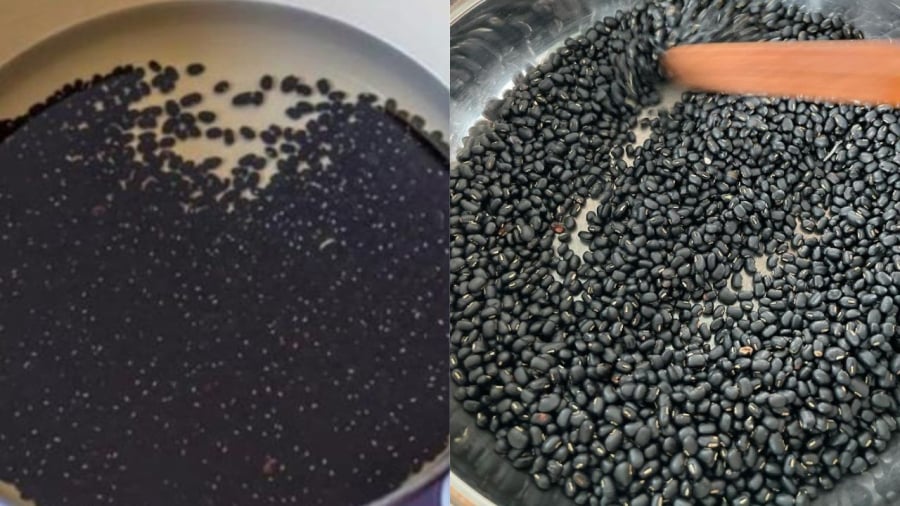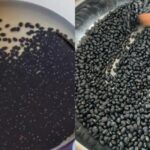Black beans are a highly nutritious food that is especially popular during the summer months. Beyond being used to make desserts, drinks, or incorporated into cooling dishes, black beans are renowned for their myriad health benefits. However, to maximize their nutritional value and avoid any undesirable side effects, savvy homemakers often share a secret tip: soaking and roasting black beans before cooking. But why are these two steps so important? Let’s delve deeper into this topic in the article below.
1. Benefits of Soaking Black Beans Before Cooking
Softer beans for faster cooking: One of the most common reasons for soaking black beans is to soften them, thereby reducing the cooking time. When soaked in water for 6-8 hours or overnight, the beans absorb moisture, expand, and become tender. This not only saves fuel but also prevents the loss of nutrients due to prolonged cooking.

Removal of anti-nutrients: While black beans are highly nutritious, they, like many other seeds and legumes, contain phytic acid and other anti-nutrients that can interfere with the absorption of essential minerals such as iron, zinc, and calcium. Soaking dissolves these compounds into the water, minimizing their negative impact on the body’s ability to absorb nutrients. Thus, soaking is a great way to ensure nutritional safety.
Reduced bloating and improved digestibility: Black beans contain oligosaccharides, complex sugars that can be difficult to digest and may cause bloating and flatulence if consumed in large quantities. Soaking black beans before cooking helps remove these sugars, making the beans easier to digest, even for those with sensitive digestive systems.
2. Why Roast Black Beans Before Cooking?
Enhanced flavor and color: Roasting black beans imparts a distinctive, richer aroma to the beans. When used for making drinks or desserts, pre-roasted beans yield a darker brown liquid with an enticing aroma, making it much more palatable than using raw beans. This is one of the key techniques employed in preparing roasted black bean drink, a well-known remedy for cooling the body and detoxifying.
Retained nutrients: Lightly roasting the beans before cooking helps seal in the nutrients during the cooking process. Additionally, dry roasting deactivates unfavorable enzymes and reduces the presence of naturally occurring harmful antioxidants in the beans.
Roasting also mitigates the cooling properties of black beans, making them more suitable for individuals with cold constitutions or sensitive stomachs.
Extended shelf life: Roasting beans before cooking or storing helps reduce moisture and eliminate bacteria, mold, and other microbes that may be present in raw beans. If you plan to store beans for an extended period, a light roast is an excellent way to ensure the beans remain dry, free from mold, and safe from pests.
3. Guide to Soaking and Roasting Black Beans Properly
a. How to Soak Black Beans
Rinse the black beans and remove any damaged, shriveled, or discolored beans.
Soak the beans in clean water for 6-8 hours or overnight. You may add a pinch of salt to aid in the cleaning process. In warm weather, change the water periodically to prevent fermentation.
After soaking, rinse the beans again and drain them before proceeding to cook or roast.

b. How to Roast Black Beans
Place the drained beans in a dry pan and turn the heat to low.
Roast the beans evenly for about 10-15 minutes, until they emit a pleasant aroma and their skins begin to crack slightly.
Avoid over-roasting, as it may compromise the nutritional value or produce harmful compounds.
Once roasted, allow the beans to cool before using them for cooking or storing them in an airtight container in a cool, dry place.
4. Precautions When Using Black Beans
Individuals with a cold constitution, consistently cold hands and feet, or low blood pressure should consume black beans in moderation to avoid any adverse effects.
Avoid combining black beans with dairy products or spinach, as these foods may interact negatively.
If drinking roasted black bean water daily, it is advisable to consume it warm and fresh, avoiding excessive consumption at once (300-500ml/day is recommended).
Soaking and roasting black beans before cooking is not just a culinary trick but also a way to safeguard your health and maximize the nutritional benefits of this superfood. By soaking the beans, they become softer, more digestible, and easier for the body to absorb nutrients from. Roasting, on the other hand, enhances the flavor, color, and preservability of the beans. Whether you’re preparing desserts, drinks, or savory dishes, don’t skip these two crucial steps. A little extra effort goes a long way in reaping the full benefits of black beans for your family’s well-being!
The Tea Seller’s Secret: The One-Step Method to Soft, Fragrant Black Beans in 10 Minutes
For generations, the art of brewing the perfect cup of Vietnamese black bean dessert soup has been a closely guarded secret. But now, a seasoned dessert soup vendor spills the beans on how to achieve that elusive creamy, nutty flavor with a simple trick. Forget the tedious hours of soaking and simmering – with this hack, you’ll have a dessert soup that tastes just like the pros’ in just 10 minutes.
































